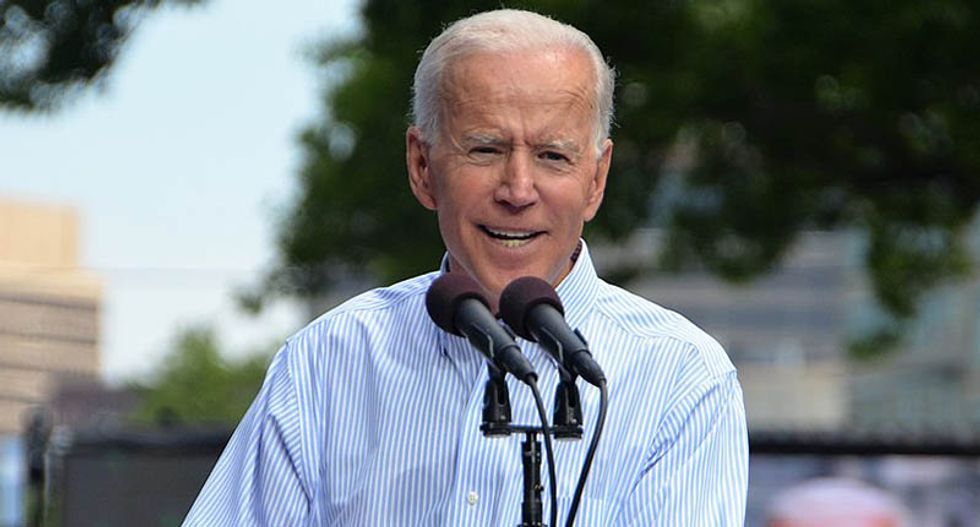Joe Biden may be uniquely positioned to fascist-proof the presidency

Joe Biden is not the kind of candidate one would expect to be a transformational president if he's elected in November. But there's one area where he would be uniquely positioned to be just that, and it's a vitally important one.
Biden has reportedly told aides that if he wins, he would serve a single term and not seek re-election in 2024, when he would be 81. According to Politico, Biden sees himself as a caretaker president who would help transition the country away from the catastrophic Trump years, and his party to a younger generation of leaders. As such, Biden may be willing to cede some of the institutional powers that have accrued to the executive branch for the past 150 years back to Congress--or to more independent institutions--in a way that a typically ambitious president would not. And a Democratic Congress, having just lived through a presidency that's been unprecedented in its contempt for its co-equal branches of government--spinning any congressional oversight as "harassment" and relentlessly obstructing it at every turn--may have an unusually strong appetite for proofing the presidency against any similarly authoritarian figures who may control the White House in the future.
The Framers of the Constitution, having revolted against a distant monarchy, were wary of executive power, and sought to limit it through the separation of powers, by giving Congress the power to impeach and creating relatively short presidential terms. But since at least the middle of the 19th Century, presidents of both parties have capitalized on various crises--and America's changing role in global affairs--to claim ever-more power for the executive. And according to The Harvard Law Bulletin, many of the constraints that have tempered executive authority in the past were matters of custom rather than Constitutional law.
The remarkably brief section of the Constitution that lays out the powers and responsibilities of the president, Article II, leaves wide swaths of open space in which presidents can flexibly interpret their powers. (Perhaps not surprisingly, presidents typically do so in their own favor.) Often, a president’s power is prescribed not explicitly by Article II, but by the norms created over the course of two centuries of history.
At the tail end of the second Bush presidency, UNC legal scholar William Marshall wrote that as a result of the steady increase in executive power, "the system of checks and balances that the Framers envisioned now lacks effective checks and is no longer in balance." He argued that "the implications of this are serious. The Framers designed a system of separation of powers to combat government excess and abuse and to curb incompetence. They also believed that, in the absence of an effective separation-of-powers structure, such ills would inevitably follow." Trump has certainly proven that those fears were justified over the past four years.
The problem, Marshall adds, is that "power once taken is not easily surrendered." That has created a "ratchet effect," with presidents closely guarding powers seized by their predecessors even if they hadn't grabbed new ones themselves. But with sufficient outside pressure, a one-term, "transitional" president might be unusually willing to sign legislation that would help fascist-proof the presidency even if those measures ultimately constrained their own administration.
Some of the things Biden might do seem like low-hanging fruit. Given that Trump is the first modern president to refuse to release his tax returns or offer detailed financial disclosures, a law requiring all future presidents to do so would be an easy and important step toward greater transparency.
Others are trickier, but equally important. Trump has abused the Federal Vacancies Reform Act to install an unprecedented number of loyalists who could not be confirmed by the Senate into "acting" leadership positions across the federal government. The law was intended to assure the smooth operation of government when a Senate-confirmed official dies or leaves suddenly by allowing the President to appoint a short-term chief while finding a permanent successor and getting that person confirmed, but it's clearly ripe for abuse. Instead of the current law allowing acting agency heads to serve for 210 days, with another 210-day extension triggered by the Senate rejecting a nominee, their terms should be limited to 90 days, or whatever minimum duration would be practicable.
Presidential emergency powers are expansive and in many cases provide an open invitation to dictatorial behavior. According to The Brennan Center for Justice, Congress has approved "123 statutory powers that may become available to the president when he declares a national emergency, including the power President Trump invoked to help build the wall... [and] an additional 13 statutory powers [that] become available when a national emergency is declared by Congress." Many of these emergency powers can be invoked by a president without restriction. In some cases, Congress can revoke an emergency declaration, but these powers need reform urgently, with set time-limits that expire unless Congress votes affirmatively to keep them in effect.
The War Powers Act, which was designed to limit a president's ability to wage war without Congressional assent, should be strengthened. Agency inspector generals, who serve as key watch dogs against corruption and abuse, should be better protected by barring a president from replacing them without Congressional approval. The independence of the Attorney General should also be guaranteed to whatever degree is permissible by the Separation of Powers. Perhaps Congress could require a supermajority to approve an AG's nomination.
This isn't meant to be an exhaustive list. The point is that Trump has thrown into sharp relief why other democracies tend to have weaker executives.
We have very good reason to fear a future president with Trump's authoritarian instincts but more discipline and smarter messaging. If Democrats win control of the White House and the Senate, and liberals and progressives take executive branch reform seriously enough to push for it, Joe Biden may be just the guy to fascist-proof the American presidency.


